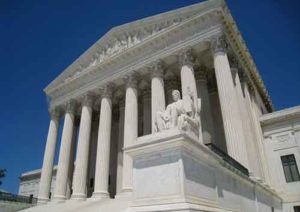Chief Justice John Roberts’ interim stay comes a day after the former president asked the high court to intervene after a lower court ruled against him.

The United States Supreme Court on Tuesday temporarily stopped the Internal Revenue Service from handing over former President Donald Trump’s tax returns to a congressional committee.
Chief Justice John Roberts issued an interim stay of a ruling from the U.S. Court of Appeals for the District of Columbia Circuit following an emergency request filed by the former president on Monday. Roberts ordered the U.S. House Ways and Means Committee, which is set to receive six years of tax returns for Trump and his companies, to respond to the former president’s emergency request by November 10.
According to SCOTUSblog:
The battle began in 2019, when the Ways and Means committee, led by Democrats, asked the IRS for tax returns associated with Trump and his businesses. A federal law, 26 U.S.C. § 6103(f), allows the committee to obtain “any return or return information” from the IRS, including tax returns for individual taxpayers.
When the Department of the Treasury under the Trump administration declined to turn over the returns, the committee sued. Before U.S. District Judge Trevor McFadden ruled on the committee’s request, President Joe Biden was elected and took office in January 2021. That prompted the committee to renew its request, this time with more information about why it wanted the returns—specifically, as part of its consideration of legislation on how federal tax laws apply to a sitting president. This time, the Treasury Department said it would turn over the documents, leading the committee to seek to dismiss its lawsuit.
Trump then filed his own claims in a bid to block disclosure of his tax documents. After the full D.C. circuit court declined to reconsider a ruling against Trump, the former president turned to the Supreme Court, pointing to comments from congressional Democrats to argue that the committee’s motive is “exposing President Trump’s tax information to the public for the sake of exposure.”
Common Dream’s work is licensed under a Creative Commons Attribution-Share Alike 3.0 License. Feel free to republish and share widely.
